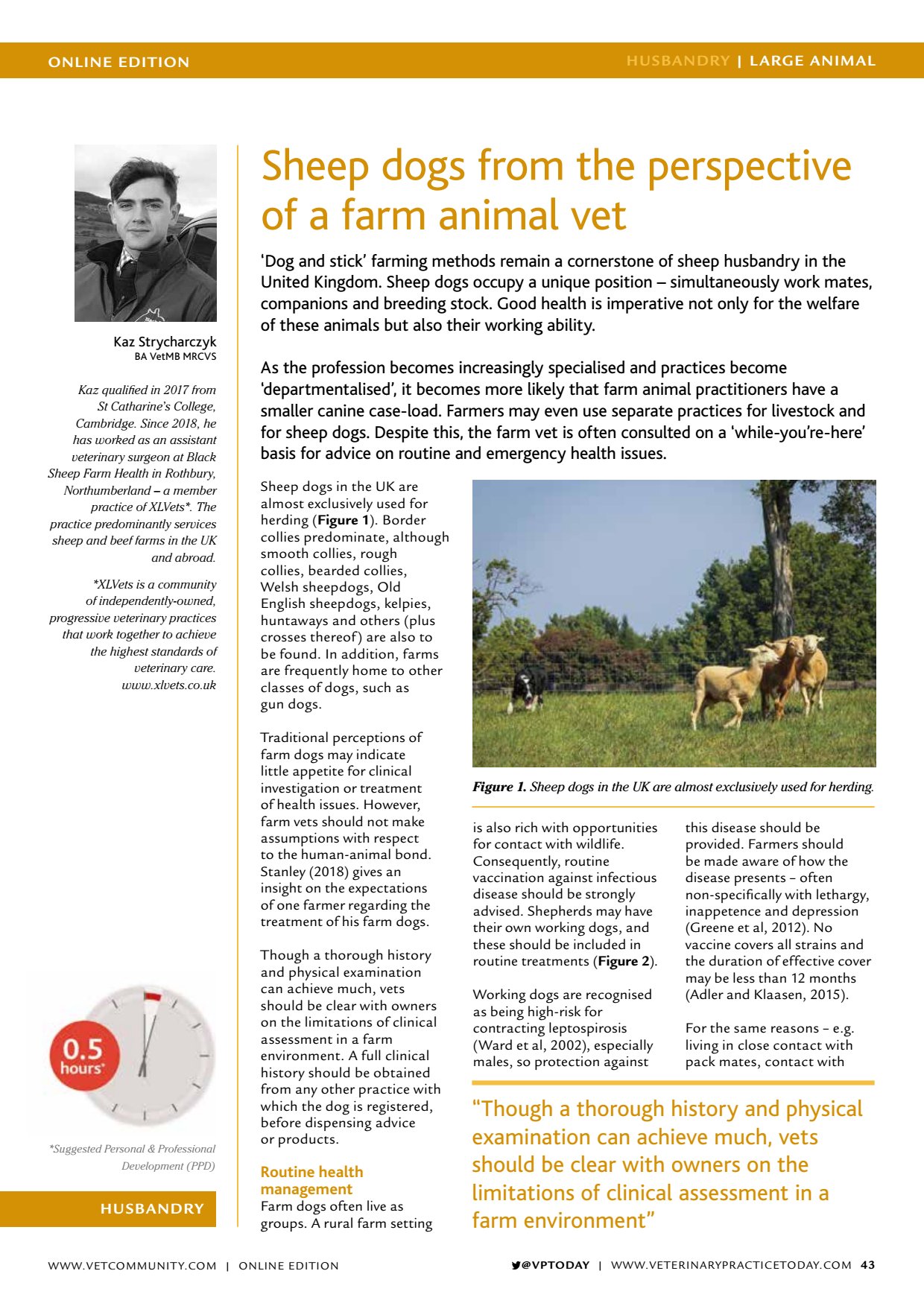Routine health management
ONLINE EDITION HUSBANDRY | L ARGE ANIMAL VPTODAY | WWW.VETERINARYPRACTICETODAY.COM 43 HUSBANDRY Suggested Personal & Professional Development (PPD) Kaz Strycharczyk BA VetMB MRCVS Kaz qualified in 2017 from St Catharines College, Cambridge. Since 2018, he has worked as an assistant veterinary surgeon at Black Sheep Farm Health in Rothbury, Northumberland a member practice of XLVets. The practice predominantly services sheep and beef farms in the UK and abroad. Sheep dogs from the perspective of a farm animal vet Dog and stick farming methods remain a cornerstone of sheep husbandry in the United Kingdom. Sheep dogs occupy a unique position simultaneously work mates, companions and breeding stock. Good health is imperative not only for the welfare of these animals but also their working ability. As the profession becomes increasingly specialised and practices become departmentalised, it becomes more likely that farm animal practitioners have a smaller canine case-load. Farmers may even use separate practices for livestock and for sheep dogs. Despite this, the farm vet is often consulted on a while-youre-here basis for advice on routine and emergency health issues. Sheep dogs in the UK are almost exclusively used for herding ( Figure 1 ). Border collies predominate, although smooth collies, rough collies, bearded collies, Welsh sheepdogs, Old English sheepdogs, kelpies, huntaways and others (plus crosses thereof) are also to be found. In addition, farms are frequently home to other classes of dogs, such as gun dogs. Traditional perceptions of farm dogs may indicate little appetite for clinical investigation or treatment of health issues. However, farm vets should not make assumptions with respect to the human-animal bond. Stanley (2018) gives an insight on the expectations of one farmer regarding the treatment of his farm dogs. Though a thorough history and physical examination can achieve much, vets should be clear with owners on the limitations of clinical assessment in a farm environment. A full clinical history should be obtained from any other practice with which the dog is registered, before dispensing advice or products. Routine health management Farm dogs often live as groups. A rural farm setting is also rich with opportunities for contact with wildlife. Consequently, routine vaccination against infectious disease should be strongly advised. Shepherds may have their own working dogs, and these should be included in routine treatments ( Figure 2 ). Working dogs are recognised as being high-risk for contracting leptospirosis (Ward et al, 2002), especially males, so protection against this disease should be provided. Farmers should be made aware of how the disease presents often non-specifically with lethargy, inappetence and depression (Greene et al, 2012). No vaccine covers all strains and the duration of effective cover may be less than 12 months (Adler and Klaasen, 2015). For the same reasons e.g. living in close contact with pack mates, contact with XLVets is a community of independently-owned, progressive veterinary practices that work together to achieve the highest standards of veterinary care. www.xlvets.co.uk Figure 1. Sheep dogs in the UK are almost exclusively used for herding. Though a thorough history and physical examination can achieve much, vets should be clear with owners on the limitations of clinical assessment in a farm environment WWW.VETCOMMUNIT Y.COM | ONLINE EDITION
